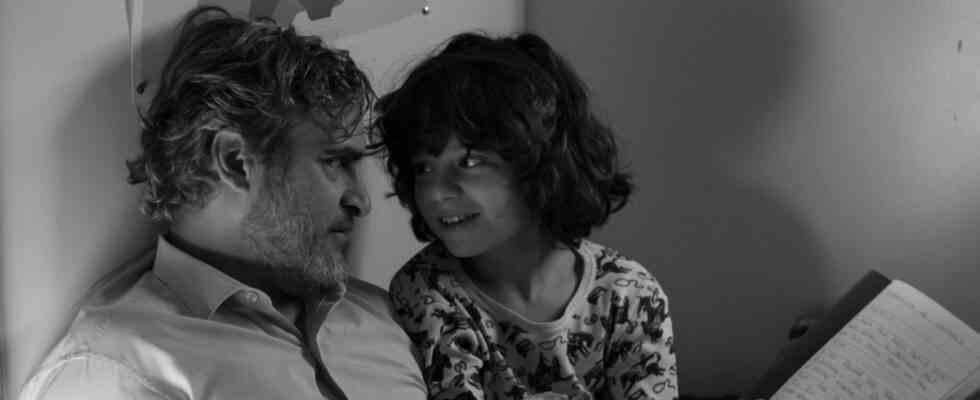This film is so quiet and delicate that one would have to shout at how great it is to avoid being lost in the roar of time. It’s nothing earth-shattering – a man babysitting his nephew, and it turns out to be a lot more complicated and tiring than he imagined. But Mike Mills traces a balancing act between caring for others and caring for oneself in “C’mon C’mon”, and maybe that’s just earth-shattering.
“C’mon C’mon” is Joaquin Phoenix’s first film role since winning an Oscar for best actor for “Joker.” He looks for the challenge in an alternative draft, in a character who is very calm and himself, a really nice guy who treats his fellow human beings with openness and benevolence. Johnny lives in New York and works in radio, he does long shows, like how children imagine their future, and he travels all over the USA. He has no children himself, in the innocent way that only men are childless because they’ve never heard a biological clock tick.
He’s in Detroit with his team when his sister calls – they haven’t seen each other for a long time since their mother died, and now she’s asking him for help. Viv (Gaby Hoffmann) has separated from her husband, who has serious mental health problems, and now she has to drive to him, and she definitely doesn’t want to take her son with her. So Johnny flies to Los Angeles to babysit him for a few days. Jesse is nine years old and has to go to school. The situation is difficult enough for him without watching his father freak out.
“C’mon C’mon” is shot in black and white. Once Los Angeles has been stripped of its bright colors, it doesn’t seem built around Hollywood anymore, it’s just a place where ordinary people try to get their lives together. Mills finds a very natural, believable tone for this story from the start. An odd reunion with the sister, somewhere between alienated and familiar, a gentle approach to Jesse the boy – how does one manage that, completely untrained, to introduce oneself as a future caregiver?
Nine-year-old Jesse involves adults in sad games
This creates strange, funny moments. A wonderful scene: “What should I call you?” Jesse asks, and Johnny replies, “Whatever suits you.” The little ponderer slumps in his chair and says: “I’m not used to being able to choose something like that.” Jesse has a unique way of dealing with the emotions surrounding his father’s mental health issues and disappearance.
He involves adults in sad games. So he says to Jesse, “I’m so sorry your kids are dead.” And when he reacts a bit dumbfounded, he adds: “You’re really not good at something like that.” Johnny actually learned to listen, it’s his job – but when he talks to the children for his show, he only finds out where their problems lie. He doesn’t have to solve them.
Woody Norman is a worthy antagonist for Joaquin Phoenix as Jesse – a bit unpredictable, difficult and precocious and yet a child. Mike Mills says his relationship with his own son inspired this story – a very personal starting point, as in his previous films, Beginners and Women of the Century, in each of which he worked into his relationship with his parents.
Mills makes films as if to prove how moving it can be when the biggest bang in a film is a change of location. A little bit of drama – Johnny is needed at work and now he takes Jesse into his life, which Viv doesn’t like and shows him how different it is when there’s someone else whose needs he has to constantly attend to . Viv remains a supporting character, her journey taking longer than planned, texting and phoning her way into the story. Johnny discovers his brood care instinct, fights it a little, constantly consults his sister for advice, and eventually grows with his responsibilities until no one can say he’s not good at it. Not even Jesse.
Mills wrote the screenplay himself, and at times his attempts to get to the bottom of human relationships border on pretentious – one book that makes use of the film, for example, is Mothers: An Essay on Love and Cruelty by British psychoanalyst and feminist Jacqueline Rose. It is about the demands placed on mothers, the impossibility of meeting them, and the cracks in a society where everyone feels under-mothered.
“Motherhood is the place in our culture, where we lodge or rather bury the reality of our own conflicts, of what it means to be fully human,” Mills quotes from it – the idea of motherhood as a place where all our conflicts converge and then be covered up. But it’s actually much nicer when he just lets such thoughts shine through in the scenes: in Johnny’s innocent childlessness, all the questions he asks his sister, the confusion when he doesn’t know what to do anymore, the quiet satisfaction when something works . There is comfort in Mills’ story: people are flexible, their wounds can heal as long as they are not too deep. And so every mistake Johnny makes comes with a chance for things to get better again. As good as it gets.
C’mon C’mon, USA 2021 – Director and Script: Mike Mills. Camera: Robbie Ryan. Starring: Joaquin Phoenix, Woody Norman, Gaby Hoffmann, Scoot McNairy, Molly Webster. Rental: DCM, 108 minutes. Theatrical release: March 24, 2022.

